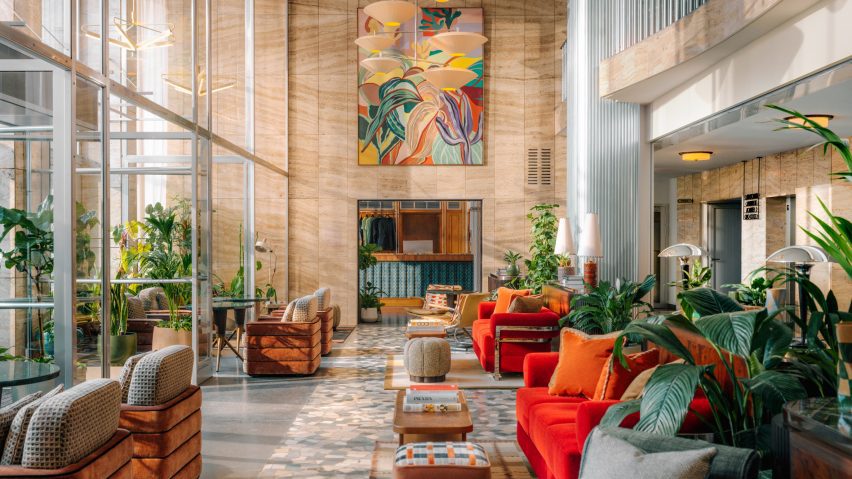AIME Studio's interiors for the latest outpost of The Hoxton hotels, in a renovated marble-clad 1950s office building in Vienna, celebrate arts and crafts and post-war modernism.
Creative studio AIME Studio has converted the former administration building of the Chamber of Commerce in Vienna, which was originally designed by architect Carl Appel, into The Hoxton Vienna.
The building now features 196 rooms, a rooftop bar and swimming pool, a restaurant, cocktail bar, a private apartment and an auditorium for events and programming.
By focussing on mid-century Austrian design, the hotel aims to show guests a less classical side of what is often considered a traditional European city.
Appel was known for shaping the "Second Ringstrasse" style of the post-war reconstruction period, which the studio referenced in its design.
"Our aim was to create a design that respected the building's history and to preserve the architectural style of the 1950s," AIME Studios' Aaron Gibson told Dezeen.
"We visited buildings in Vienna designed by Carl Appel and renowned Austrian architects of the early 20th-century – like Adolph Loos and Otto Wagner – which inspired the interiors for The Hoxton Vienna," Gibson added.
The double-height lobby of The Hoxton Vienna preserves key features and details from Appel's original 1950s design.
The mid-century finishes of stones and metals in the original office building set a neutral and semi-industrial context for the renovation.
"We deliberately used the key features and details from Carl Appel's original design for the architecture and the interior as a basis for our decision-making throughout the ground floor," the studio said.
AIME Studios also worked with The Federal Monuments Authority Austria, which enforces the Monument Protection Act in order to explore, protect and maintain Austria's cultural heritage.
Together they selected furniture items for the hotel which reflect the 1950s, including light fittings, armchairs, sofas, and even the fabrics and textiles used in the space.
"We inherited amazing existing features like the large format terrazzo flooring, travertine walls and corrugated aluminium columns, which are all great examples of 1950s architecture," AIME told Dezeen.
The interior scheme complements the existing restrained colour palette of the natural stones' soft hues of green-grey, beige and blue tones.
The studio also took inspiration from the Wiener Werkstätte (Viennese workshops), one of the longest-lived design movements of the 20th century and a key organisation for the development of modernism.
Centred in the Austrian capital, it bridged traditional methods of manufacture and avant-garde aesthetics.
In the bedrooms, geographic patterned curtains are influenced by iconic Werkstätte fabrics and ruched headboards are inspired by Loos' style.
"We selected Viennese fabrics with restrained colours and quiet and small-scale patterns, demonstrating a contemporary take on the Wiener Werstätte arts and craft movement," Gibson explained.
Besides the usual hotel program of rooms and restaurants, The Hoxton Vienna features a large auditorium designed in a 1950s palette of pale yellow and blue with mid-century wood panelling, furniture and fittings.
The auditorium will host events like stand-up comedy, gigs and conferences, as part of the wider cultural programming of The Hoxton Vienna.
The hotel also has a private "apartment," which is an open-plan series of rooms across different levels, including kitchen, dining, sitting and meeting spaces.
The interiors of the apartment distil the essence of AIME Studios' interior design at The Hoxton, with Wiener Werstätte patterns and colours, mid-century modernist furniture and light fittings, and artwork referencing the period.
Other hotels from The Hoxton that have recently featured on Dezeen include their first opening in Germany with The Hoxton Charlottenburg in Berlin and the Ricardo Bofill-inspired The Hoxton Poblenou in Barcelona.
Photography is by Julius Hirtzberger.

